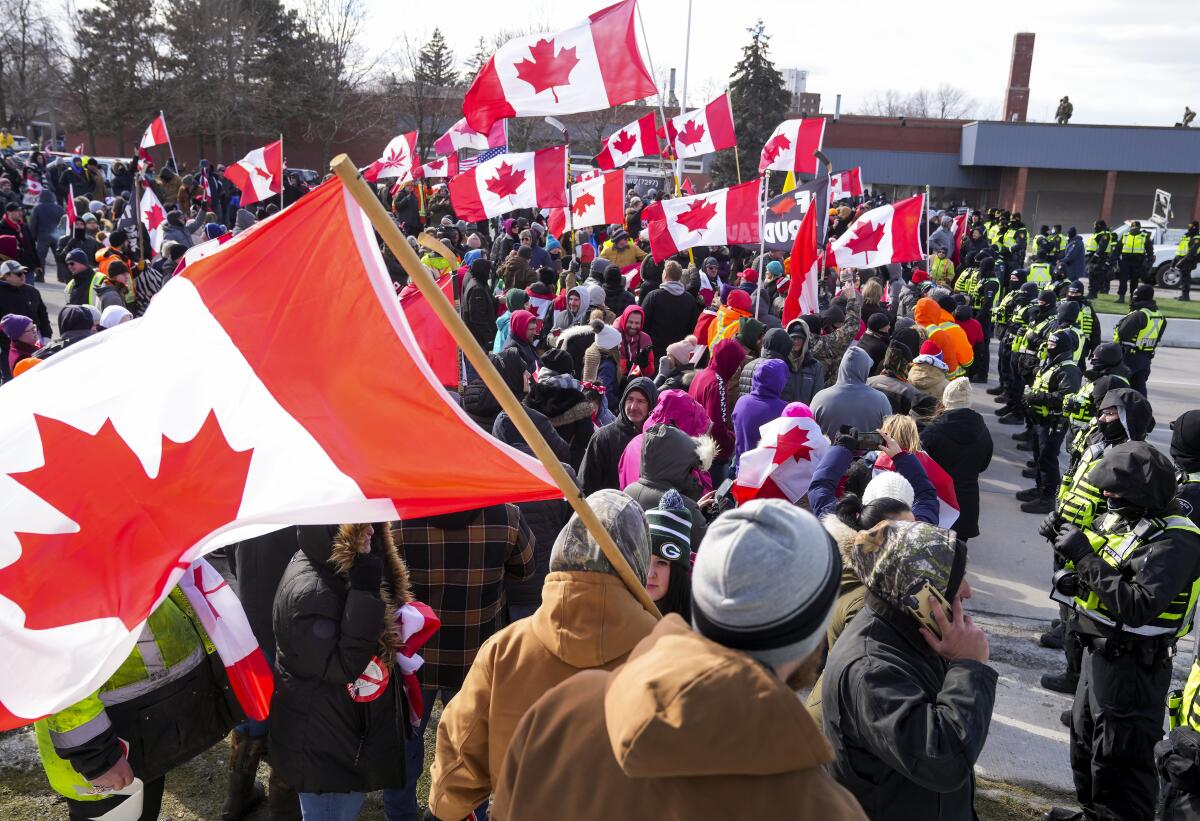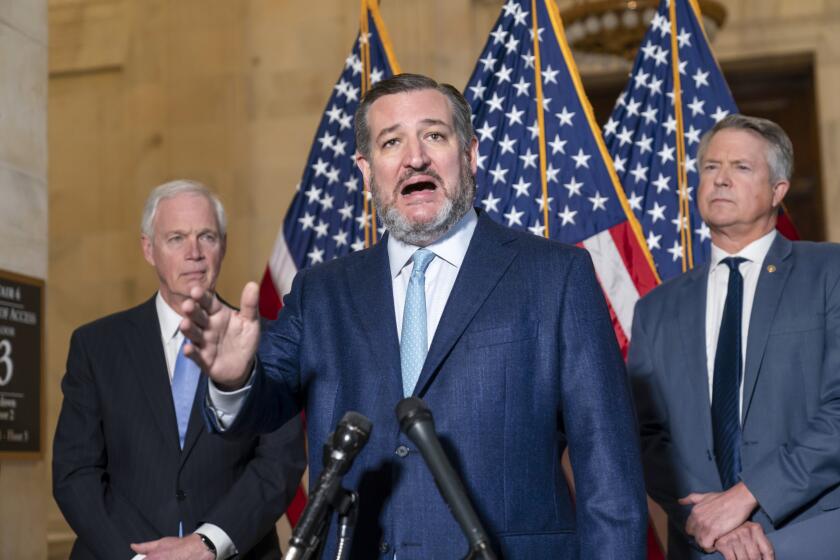Angry truckers paralyzed Canada’s capital. It could happen here too

- Share via
WASHINGTON — The pictures from Ottawa over the last two weeks have defied every American stereotype of Canadians. We think of our northern neighbors as incorrigibly polite, their politics as moderate and their capital city — when we consider it at all — as boring, the Sacramento of the north.
Suddenly, however, Ottawa has become the center of a global populist backlash against vaccine mandates and, more broadly, elitist liberal governments.
About 500 truckers angry about new border-crossing rules between Canada and the United States have occupied the city’s central core.
They’ve been reinforced by thousands of other protesters, some waving Trump banners, swastika flags and placards with decidedly impolite epithets aimed at Prime Minister Justin Trudeau.
Insistence that Black Americans no longer face discrimination and that whites do has increasingly become a key belief among Republicans.
The mayor and police chief, after 11 days of Canadian restraint, declared a state of emergency and asked the federal government for help, but protesters appear to be settling in — and planning on more.
For much of the last week, copycats blocked the most important land crossing between Canada and the United States, the Ambassador Bridge across the Detroit River, which normally carries almost one-third of the two countries’ manufacturing trade. The effect on North America’s supply chain was nearly instant; automotive factories from Ontario to Alabama cut production as they ran low on parts.
More copycat protests have sprung up from Australia to France, and U.S. groups say they are trying to organize a similar truck convoy from California to Washington.
The protesters’ demands are often vague. In Ottawa, they ranged from an immediate end to all pandemic regulations to Trudeau’s resignation. (The prime minister rejected both.) But the common threads are clear: anti-vaccine militancy and general anger at government, a stubborn package of populist libertarianism.
“Most of the protesters in Ottawa are not truckers at all,” Martin Geoffroy, a scholar of Canadian extremist movements at Édouard-Montpetit College near Montreal, told me last week. “They include a collection of far-right movements which existed before the pandemic. All of them have one thing in common: They are opposed to the authorities.”
Also, many of them admire former President Trump.
“What we’re seeing is a spillover of Trumpism into Canada,” he said. “We’ve seen Trump flags, QAnon flags, flags that say ‘Don’t tread on me.’ These are American symbols, not Canadian.”
The admiration runs both ways. “The Freedom Convoy is peacefully protesting the harsh policies of far left lunatic Justin Trudeau who has destroyed Canada with insane Covid mandates,” Trump said in a written statement. (In fact, Canada has weathered the pandemic with a death rate roughly one-third of ours thanks largely to its higher vaccination rate.)
On Fox News, Tucker Carlson called the convoys the “single most successful human rights protest in a generation” and suggested the time might be ripe for similar actions south of the border.
“Most of the time, trends start in the United States and they move north to Canada,” he said. “But this time, the opposite could happen.”
Other American conservatives raised money — $10 million by one estimate.
The protesters’ claims to speak for the average Canadian, however, are belied by polls showing that the truckers’ blockade was widely unpopular even before it began mucking with the supply chain.
In a survey by the Leger polling organization, 65% of respondents called the demonstrators a “small minority of Canadians who are thinking only about themselves.”
Only 32% said they supported the protesters’ demands — although 44% said they were sympathetic to their frustration (a quintessentially Canadian response).
Frank Graves, a pollster at Ekos Research in Ottawa, noted that sympathy for the protesters was strongest among conservatives, people in rural areas and people without a college education — all groups similar to Trump’s main backers in the United States.
As recently as 2020, Canadians expressed much higher trust in government than Americans. “That’s one of the reasons Canada did better in terms of vaccinations,” he said.
But as the pandemic has persisted, Canadians’ trust in their leaders has ebbed, and the differences between the two countries’ political cultures have narrowed.
“We’re moving closer, not farther apart,” he told me.
Canada’s Conservative Party has been moving rightward as well. Two weeks ago it dumped its last leader, Erin O’Toole, in part because his moderate tone was out of step with his party’s populist wing. (He also lost last year’s election to Trudeau.)
His interim successor, a Manitoba populist named Candice Bergen (not the star of “Murphy Brown”), was once photographed wearing a “Make America Great Again” cap. She embraced the truckers, hailing their “peaceful protest.”
But by the end of last week, Bergen, noticing that voters’ patience was running out, executed a U-turn.
“The time has come down to take down the barricades,” she said Thursday. “The economy you want to see reopened is hurting.”
Trump, Carlson and other U.S. conservatives may be cheering for the truckers now, when they’re disrupting lives a safe distance north of the border. They should be careful what they wish for.
More to Read
Get the L.A. Times Politics newsletter
Deeply reported insights into legislation, politics and policy from Sacramento, Washington and beyond. In your inbox twice per week.
You may occasionally receive promotional content from the Los Angeles Times.












